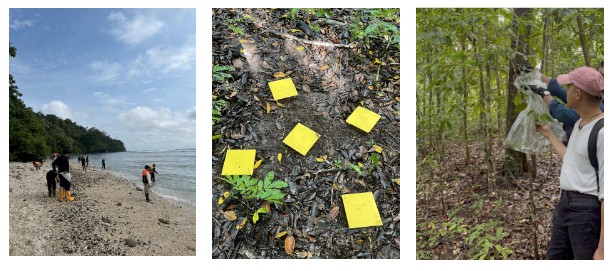The Innovation Journey of ITB Described in Temasek Foundation-National University of Singapore
By Adi Permana
Editor Adi Permana

BANDUNG, itb.ac.id—Prof. Reini Wirahadikusumah, Ph.D., the ITB Rector, attended the Temasek Foundation-National University of Singapore as part of the Programme for Leadership in University Management event on Wednesday (9/11/2022). She was one of the panelists for the session "The journey of ASEAN academic institutions in fostering innovation and entrepreneurship".
The 10th summit of the Temasek Foundation-National University of Singapore explores the three important themes: innovation and entrepreneurship, the ASEAN sustainability agenda for universities and cities, as well as how regional university cooperation has and will transform Southeast Asian universities in the past and future decade.
Prof. Reini recounted ITB's journey in innovation in the context of the reformation of national education. In the mid-1990s, a nationwide monetary crisis occurred, triggering national policy reforms, including those in the research, technology, and education sectors.
"The college autonomy policy was introduced in 1999 and underwent subsequent changes. ITB was among the first to pioneer this which are nowadays called state-owned public universities.”
Furthermore, initiatives on innovation and entrepreneurship have been carried out by ITB since the early 1970s, but there is still a lack of support from the institution. Hence, ITB began the organization and institutional development master plan that spans from 2006 to 2030 upon becoming a state-owned public university. "Interdisciplinary research, teaching, innovation and entrepreneurship have become the key concerns of ITB," Prof. Reini said.
There are several challenges faced by ITB. The Rector stated that ITB solves these challenges as if they are creating a patchwork- working piece by piece, putting things together, adding new elements and integrating it, and so on. "We try different things and try to learn from the feedback we receive.”
Based on the master plan, ITB is expected to have a role as a driver of innovation and an incubator for technology commercialization in the national industrial sector. To make it happen, they strategize in building an ecosystem of innovation via connectivity and coordination of science and technology research centers at ITB.
On a national scale, innovation models are still being pursued. The autonomy model of universities is also being discussed with stakeholders to increase scientific productivity, economic relevance of research in universities, and the issue regarding graduates in their jobs. Hence, ITB established LPIK (Institute for Innovation and Entrepreneurship Development) as an innovation hub.
LPIK has launched the IES (Innovation Entrepreneurship System) program, a co-creation platform between stakeholders that could be used as a virtual innovation park. Each stakeholder can create value with the support of appropriate resources and facilities.
From these efforts, some of them have been successfully commercialized. Examples are the red and white catalyst for biofuel production, collaboration with PT Pupuk Kujang-Pertamina, the NIVA (Non-Invasive Vascular Analyser) tool made by ITB and PT SNCP, and the Isolated Ground Shield Wire Medium Volatege-Distribution Tower in collaboration with ITB and PT Rekacipta Inovasi-TDE.
Another innovation presented by Prof. Reini in the forum was Vent-I, the portable ventilator that has been successfully tested, patented, and used in hospitals. The Khaira Energy: Smart Battery System is also mentioned during her discussion.
Closing her presentation, Prof. Reini concluded that Indonesia needs stronger research relevance through innovation and entrepreneurship. A broader scientific curiosity to create science-preneurship, techno-preneurship is also needed to promote a scientific culture. In addition to entrepreneurship, there are external constraints related to existing national conditions. In this regard, sandboxing and collaborative approaches have been adopted.
Prof. Reini added that the ITB Innovation Park is a great opportunity yet poses a big challenge. Institutional agility and capacity are key requirements to overcome it. ASEAN communities need to be more active in driving regional innovation systems for prosperity and sustainability.
Reporter: Adi Permana
Translator: Ruth Nathania (Environmental Engineering, 2019)

.jpg)

.jpg)
.jpg)
.jpg)


